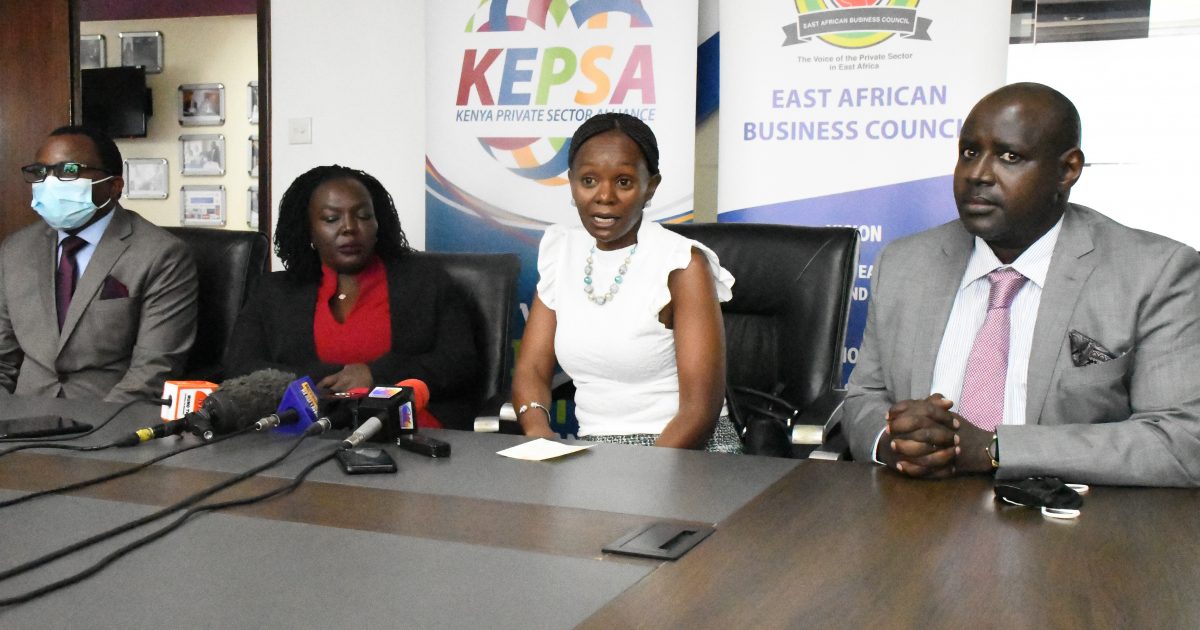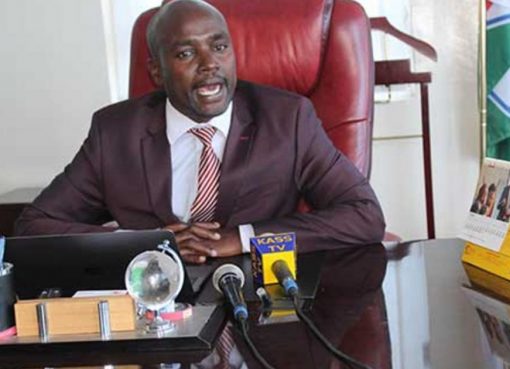The Kenya Private Sector Alliance (KEPSA) hosted the East African Business Council (EABC) focal point roundtable meeting to address pertinent issues affecting businesses in the region and deliberate on a way forward.
This was the first meeting after many years that brought together representatives from different East Africa nations to discuss the economic recovery of their countries from the Covid-19 crisis.
Speaking at KEPSA’s Headquarters in Nairobi, KEPSA Chief Executive Officer (CEO), Ms Carole Kariuki, revealed that the meeting was to harness the resources of the East African Community (EAC) economic block and initiate programmes of economic recovery.
Kariuki said that the closed door consultative meeting highlighted various issues impeding the Free Trade Agreements (FTAs) in the region.
“From our discussions, there is need to formulate a way to market together our similar products and markets,” she stated.
Kariuki added that the countries should also devise ways to create online jobs and platforms in order to mitigate the challenges of economic recovery.
The CEO urged every stakeholder to support the drive of sharing experiences, especially in the wake of the Covid-19 pandemic and bolster bilateral interactions for an improved trade and investment in the region.
“The Green Economy which is part of the region’s Sustainable Development Goals, requires us to share more of it, for instance the water bodies, and discover new opportunities that did not exist earlier,” Kariuki said.
EABC CEO, John Bosco Kalisa, on the other hand, praised the engagements for coming up with different recommendations, to ensure the economic recovery of the region.
He said the deliberations recommended each country to have and promote a common EAC vaccination certificate that will ease travel restrictions.
“People should not undergo vigorous testing every time they travel from one country to another in the region,” he lamented, while echoing Kariuki’s sentiments that urged the Council of Ministers for Health to move quickly and have the certificate hopefully by December.
Kalisa lauded KEPSA for their E-Commerce platform in supporting a quick economic recovery, adding that other countries have learned a lot from it.
He further recommended the removal of the new Non-Tariff Barriers (NTBs), citing the dormant NTB Act 2017 be restored to that effect.
“There were 60 NTBs when Tanzanian President, Samia Suluhu Hassan, last visited Kenya but now 31 have been resolved,” Kalisa noted as he encouraged clear solutions, like new innovations and lessons from Covid-19, to eliminate NTBs that impede trade.
“We are quickly working with the EAC Secretariat to ensure opportunities such as the E-Commerce platform, Small and Medium-sized Enterprises (SMEs), Youths in business and the Value chain are provided by FTAs, despite the Covid-19 impediments,” Kalisa maintained.
The CEO further noted that pharmaceuticals, textile, and agribusiness are some of the industries that require added value, to reduce wastage and make the region a circular economy.
He reiterated that other countries have also learnt a lot from Kenya on SMEs and the Council is planning on creating an SME Club that offers training, affordable finance, capacity building, and book keeping for businesses.
“The private sector should play an active role in engaging, sharing, and advocating for solutions to issues impeding trade by constantly working together,” he emphasized, adding that the sector should foster public-private dialogue to leverage political will by continuously engaging with the government.
Meanwhile, the SMEs Chairperson and a Board member of the EABC, Mary Ngechu, said that SMEs experience different pains at the levels they are in and it is important to address the challenges, specifically.
“80 percent of businesses in our region are SMES and there is need to scale them up to enable them learn from big businesses,” she urged
Ngechu added that it is important to have an integrated value chain, where SMEs are coordinated so as to aggregate similar products and market them effectively.
The Private Sector Foundation Uganda Acting Executive Director, Francis Kisirinya, said the discussions in the focal meeting will address how the private sector organizations can lead in the engagements, by collecting views from the SMEs, harmonizing them and finally presenting them to the policy makers from a country’s perspective to a regional perspective.
“Policy making is a challenge in many countries and most of the time policies are neither people-centred nor business-centred,” he cautioned.
The Secretary General, Burundi Chamber Of Commerce and Industry, Denis Nshimirimana, noted that East African countries do not trade among each other enough.
“We have to learn from KEPSA on how they created a million online jobs within 18 months, which is very impressive,” he advised.
He added that it is only through positive exchange that the region can fully utilize the African Continental Free Trade Area.
All the other focal point CEOs and Chairpersons attended the meeting online where South Sudan addressed the NTBs, while Tanzania proposed one network through the removal of visas.
By Michael Omondi and Njeri Kariuki





